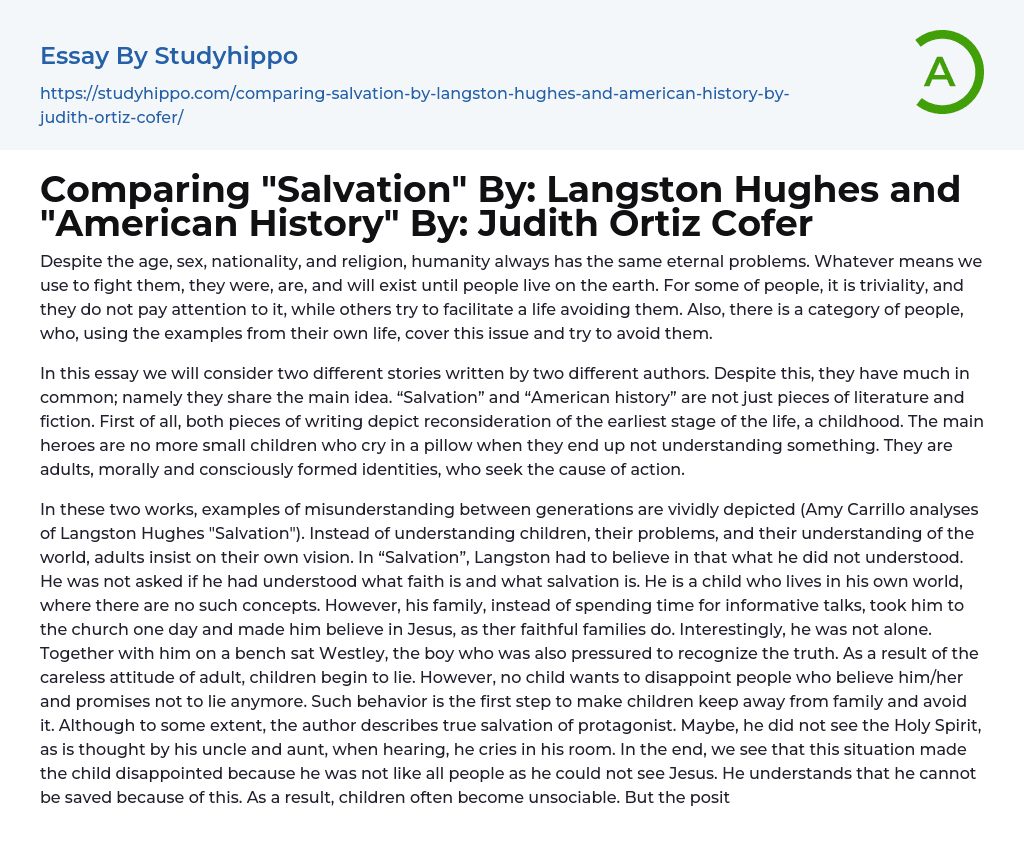Regardless of age, gender, nationality, or religion, humanity consistently confronts enduring problems. These issues have persisted throughout history and will continue to persist as long as people inhabit this planet. While some may perceive these problems as insignificant and not give them much thought, there are individuals who strive to make life easier by avoiding these challenges. In addition, a particular group actively addresses this issue by sharing personal stories in an effort to overcome these problems.
This essay will discuss two separate stories written by different authors, despite having many similarities in their main ideas. Both "Salvation" and "American history" are more than just pieces of literature; they explore the reflection of childhood, when the protagonists are no longer innocent children who cry when they don't understand something. Instead, they are now adults with firm mor
...al and conscious identities who seek to understand the motivations behind their actions.
These works vividly depict the miscommunication between generations, as analyzed by Amy Carrillo's study of Langston Hughes' "Salvation." Rather than empathizing with children and their struggles, adults impose their own perspectives onto them. In "Salvation," Langston is forced to believe in something he doesn't understand. He is not given the opportunity to question or comprehend the concepts of faith and salvation. Living in his own world, where these ideas are foreign, Langston's family takes him to church one day and coerces him into believing in Jesus, as faithful families often do.
Interestingly, Langston is not alone in this experience. Alongside him sits Westley on a bench, another boy who is pressured to acknowledge this truth. Due to the negligent attitudes of adults, children resort to lying. However, no child
wants to disappoint those who believe in them and make promises never to lie again.The text discusses the impact of certain behavior on children, causing them to distance themselves from their families and avoid interaction with them. The author acknowledges that the protagonist may have indeed found true salvation, despite not experiencing the presence of the Holy Spirit as believed by his uncle and aunt. This realization leads to disappointment for the child, as he feels different from others who can see Jesus. Consequently, children often become unsociable. However, it is noted that the child's sincerity in crying represents a positive moment, as he recognizes the lie within the church unlike his relatives, who fail to understand their own selfishness and lack of respect towards the child. This inability to comprehend their own actions prevents the child from attaining the emotional salvation they speak of. The text then compares this situation to "American history," emphasizing that although there may be different scenarios and characters, the underlying issue and goal remain the same as depicted in Langston Hughes' "Salvation." The famous writer Oscar Wilde once stated that parents are often the most selfish individuals, a sentiment echoed in the example of Skinny Bones, a schoolgirl who isolates herself due to being ridiculed for her unusual appearance, thereby lacking friends and social interaction during school hours.There is a person who appears later, and it is important to note that her parents are not interested in her life. They only discuss their own plans for the future or reminisce about the past. The girl feels alone and her mother only focuses on morality, not her daughter's feelings. The
conflict in the novel intensifies when the president is killed, and the girl cannot understand how this situation affects those around her (Cofer). The teacher is the first person to attack the children. Teachers should teach patriotism, but the students seem unaffected by the murder, angering the teacher. Similarly, when the girl returns home, her mother blames her for planning to visit a friend instead of mourning with the family. After an unsuccessful walk, the girl cries in despair because she doesn't know how to feel in this situation. Hughes and Cofer leave the ending of their stories open for each individual to solve these problems on their own.Despite their differing perspectives, both authors emphasize the importance for parents to remember that their excessive selfishness results in their children suffering.
- Child essays
- Child labor essays
- Childcare essays
- Adam And Eve essays
- Baptism essays
- Catholic Church essays
- Christian essays
- Church essays
- Crucifixion Of Jesus essays
- Crusades essays
- Elizabeth essays
- Eucharist essays
- God The Father essays
- Holy Spirit essays
- Jesus Christ essays
- Lord essays
- Pope essays
- Priest essays
- Protestant Reformation essays
- Protestantism essays
- Sacrament essays
- Aldous Huxley essays
- Alice Walker essays
- Amy tan essays
- Anne Bradstreet essays
- Anton Chekhov essays
- Arthur Miller essays
- Augustine essays
- Bertolt Brecht essays
- Booker T Washington essays
- Carol ann duffy essays
- Charles Dickens essays
- Charlotte Perkins Gilman essays
- Chinua Achebe essays
- Christina Rossetti essays
- Consider The Lobster essays
- Edgar Allan Poe essays
- Elizabeth Bishop essays
- Emily Dickinson essays
- Ernest Hemingway essays
- F. Scott Fitzgerald essays
- George Orwell essays
- Harper Lee essays
- Homer essays
- James Baldwin essays
- Jane Austen essays
- John Donne essays
- John Steinbeck essays
- Kate Chopin essays
- Kurt Vonnegut essays




